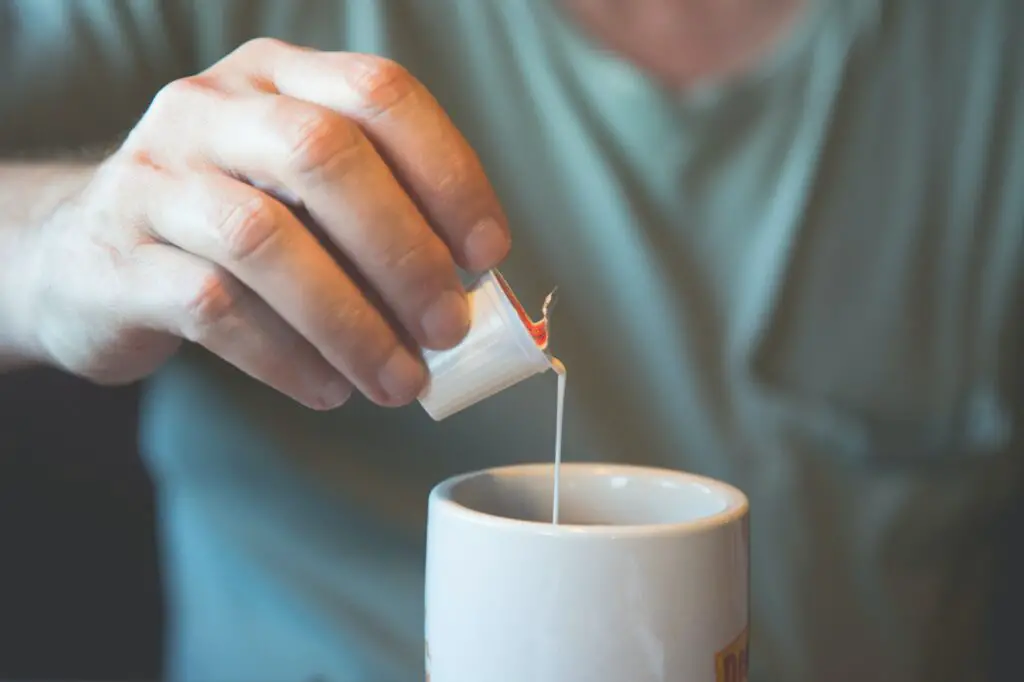How Does Caffeine Affect Your Sleep?
Are you one of those people who can’t function without their morning cup of coffee or other caffeinated beverage? While caffeine may give you the energy boost you need to start your day, it might also be the reason for your sleepiness at night.
Caffeine is a stimulant that affects the central nervous system, making it harder for you to fall asleep and stay asleep for an hour or more. This also applies to energy drinks that contain high levels of caffeine.
However, the duration of its effect varies depending on several factors such as age, weight, and metabolism.
When you consume a caffeinated beverage, such as coffee or energy drinks, it blocks adenosine receptors in your brain. Adenosine is a chemical in your body that builds up throughout the day and signals your brain when it’s time to sleep. By blocking these receptors with coffee beans, caffeine disrupts this natural process and keeps you awake, especially if you have an afternoon coffee. However, once the effects of caffeine wear off, you may experience a crash or feel tired.

Research has shown that caffeine, found in coffee, energy drinks, soft drinks, and some medications, can have stimulant effects on your body for up to six hours after consumption. This means that if you drink a cup of coffee at 3 pm, half of the caffeine will still be in your system at 9 pm. So if you’re having trouble sleeping at night, consider cutting back on your caffeine intake or avoiding it altogether in the afternoon and evening.
Factors That Affect the Duration of Caffeine’s Effects on the Body
Amount of Caffeine Consumed
The amount of caffeine consumed through drinks is a significant factor in determining how long it will stay in your body. The more caffeine you consume, the longer its energy-boosting effects will last. For example, drinking one cup of coffee may keep you awake for two to three hours, while consuming two cups may extend that time to four to six hours. If you are struggling with natural sleep, it is best to avoid consuming caffeine-containing drinks or sleep medicine before bedtime.
Genetics
Genetics play a role in how quickly your body metabolizes caffeine found in coffee beans. Some people have genes that make them metabolize caffeine faster than others. As a result, they may not feel the effects of their afternoon coffee drinks as strongly or for as long as someone who metabolizes caffeine more slowly. This is because caffeine blocks adenosine, a chemical that builds up in the brain throughout the day and helps to regulate sleep.
Other Factors
Other factors like age, weight, and medication use can also impact how long caffeine stays in your system. Younger people tend to metabolize caffeine faster than older adults because their liver function is better. Individuals with higher body fat percentages tend to experience longer-lasting effects from caffeine since it takes longer for their bodies to process it. If you often have afternoon coffee or other caffeinated drinks, it may take longer for adenosine, a chemical that signals sleepiness, to build up in your brain and make you feel tired.
Medications can also affect the stimulant effects of drinks containing caffeine and how long it stays in your system. Certain substances like birth control pills and antibiotics interfere with enzymes responsible for breaking down adenosine, causing caffeine to remain in the body for an extended period.
FDA Guidelines
According to the FDA (Food and Drug Administration), the half-life of caffeine varies from person to person but usually ranges between 4-6 hours. Half-life refers to how long it takes for half of the substance to be eliminated from your body after drinking beverages containing caffeine. This information is important to consider when making claims in caffeine-related advertisements.
Receptors
Caffeine found in drinks works by binding with receptors in your brain that are responsible for making you feel awake and alert. Over time, these receptors become desensitized to caffeine’s effect, meaning you need more of it to achieve the same feeling. Many advertisements promote drinks containing caffeine as a quick fix for staying alert and focused.
Long-Term Effects
Consuming large amounts of caffeinated substances over an extended period can lead to side effects like insomnia, nervousness, and jitters. Caffeine consumption should be monitored to prevent caffeine poisoning, especially for those with caffeine sensitivity. Beware of advertisements that promote excessive caffeine intake.
How Long Does Caffeine Keep You Awake?
Caffeine Half-Life
If you’re wondering how long caffeine keeps you awake, it’s essential to understand the half-life of caffeine. The half-life of caffeine is about 5 hours, meaning half of the consumed amount will still be present in your body after this time. So, if you drink a cup of coffee containing 200 milligrams of caffeine at 3 pm, by 8 pm, there will be around 100 milligrams left in your system.
Large Amounts and Late Consumption
Consuming much caffeine or consuming it later in the day can extend its effects beyond 5 hours. For instance, if you have two cups of coffee or drink more than 400 milligrams of caffeine within several hours, it may take longer for your body to process it fully. As a result, you may experience insomnia or difficulty falling asleep.
Elimination Time
It takes around 12 hours for most people to eliminate caffeine from their bodies fully. However, some factors can affect how fast your body processes and eliminates caffeine. These factors include age, weight, overall health condition, genetics, and medication use.
Afternoon Coffee
If you’re planning on drinking coffee in the afternoon and want to avoid staying up late at night due to its effects on sleep quality and duration, consider drinking decaffeinated coffee instead. Alternatively, limit your consumption to one cup or switch to tea that contains lower amounts of caffeine.
The Relationship Between Caffeine and Sleep Quality
Consuming too much caffeine or consuming it too late in the day can negatively impact sleep quality.
Caffeine is a stimulant that can help you stay awake and alert, but it can also interfere with your sleep. If you consume too much caffeine or drink it too late in the day, it can keep you awake at night. The effects of caffeine on sleep vary from person to person, depending on factors such as caffeine sensitivity, age, and overall health.

To avoid disrupting your sleep patterns, experts recommend limiting your caffeine intake to no more than 400 milligrams per day (about four cups of coffee). It’s also best to avoid consuming caffeine within six hours of bedtime. This will give your body enough time to metabolize the caffeine before you go to bed.
Even small amounts of caffeine can disrupt sleep patterns for some individuals.
Some people are more sensitive to the effects of caffeine than others. Even small amounts of caffeine can cause insomnia or disrupt sleep patterns for these individuals. If you’re one of them, it’s best to limit your consumption of caffeinated beverages or avoid them altogether.
It’s worth noting that not all sources of caffeine are created equal. For example, tea contains less caffeine than coffee, while energy drinks may contain much higher levels. Be mindful of the amount of caffeine you’re consuming from different sources throughout the day.
Regular consumption of high doses of caffeine may lead to chronic insomnia.
While occasional use of caffeinated beverages is unlikely to cause long-term problems with sleep quality, regular consumption at high doses may lead to chronic insomnia. Individuals with caffeine sensitivity should be cautious when consuming caffeinated beverages as it may exacerbate their condition. Moreover, excessive consumption of caffeine may lead to caffeine poisoning, resulting in symptoms such as rapid heartbeat, muscle tremors, and seizures. Chronic insomnia is a persistent condition characterized by difficulty falling asleep or staying asleep despite adequate opportunities for rest.
If you find yourself needing large amounts of caffeine consumption or other caffeinated beverages just to function normally throughout the day, this could be a sign that you’ve developed a dependence on these substances. Be careful not to overdose and experience caffeine poisoning.
Recommendations for When to Stop Consuming Caffeine for a Good Night’s Sleep
Do you ever wonder how long caffeine consumption keeps you awake? If you’re someone who enjoys a cup of coffee or tea before bed, you may want to reconsider your habits to avoid caffeine poisoning.
Avoid Caffeine at Least 6 Hours Before Bedtime
Experts recommend avoiding caffeinated beverages at least six hours before bedtime. This gives your body enough time to process the caffeine and reduce its effects on your system. However, keep in mind that everyone is different, and some people may be more sensitive to caffeine than others. If you find that drinking coffee or tea six hours before bed still affects your sleep quality, try stopping consumption earlier in the day.
Alternative Beverages Before Bedtime
If you’re used to having a warm beverage before bed but want to avoid caffeine altogether, there are plenty of alternatives available. Decaf coffee is an excellent option for those who still enjoy the taste of coffee without the stimulating effects of caffeine. Herbal teas such as chamomile or lavender can also help promote relaxation and improve sleep quality.
Other Tips for Better Sleep
While avoiding caffeine is essential for better sleep, there are other tips you can follow as well:
- Stick to a consistent sleep schedule: Going to bed and waking up at the same time every day can help regulate your body’s internal clock. It is also important to monitor your caffeine consumption, as it can disrupt your sleep patterns.
- Create a relaxing bedtime routine: Engage in activities such as reading or taking a warm bath before bed to signal your body that it’s time to wind down.
- Keep electronics out of the bedroom: The blue light emitted by electronic devices can interfere with melatonin production and disrupt sleep.
- Make sure your sleeping environment is comfortable: A cool, dark, and quiet room can help promote restful sleep.
Understanding Caffeine Withdrawal and Its Effects on Sleep
Caffeine Withdrawal Symptoms
Caffeine is a stimulant that can help improve alertness, concentration, and productivity. However, consuming high doses of caffeine regularly can lead to dependence, and stopping consumption abruptly may result in withdrawal symptoms such as headaches, fatigue, irritability, and difficulty concentrating. These symptoms can last for several days or even weeks.
Impact on Sleep Quality
Withdrawal symptoms can also negatively impact sleep quality and duration. Studies have shown that caffeine intake close to bedtime can delay sleep onset, reduce total sleep time, and increase wakefulness during the night. Therefore, regular consumption of high doses of caffeine may lead to poor sleep quality and quantity.
Mitigating Withdrawal Symptoms
Gradually reducing caffeine intake over time can help mitigate withdrawal symptoms. For example:
- Reduce daily caffeine intake by 25% every few days until you reach your desired level.
- Replace caffeinated drinks with non-caffeinated alternatives such as water or herbal tea.
- Avoid consuming caffeine close to bedtime.
- Consider taking a break from caffeine altogether for a few weeks to reset your tolerance.
It’s important to note that everyone’s body reacts differently to caffeine withdrawal, so it’s essential to listen to your body’s signals. If you experience severe symptoms or have concerns about your health, consult a healthcare professional.
Managing Your Caffeine Intake for Better Sleep
In conclusion, managing your caffeine intake is crucial if you want to get a good night’s sleep. Factors such as age, weight, and genetics can affect how long caffeine stays in your system and keeps you awake. On average, it takes about 5-6 hours for half of the caffeine to be eliminated from your body. However, the effects of caffeine can last up to 12 hours or more depending on various factors.
Drinking coffee or other caffeinated beverages close to bedtime can disrupt your sleep quality and lead to insomnia. It’s recommended that you stop consuming caffeine at least six hours before going to bed. If you’re sensitive to caffeine, it’s best to avoid it altogether.
Caffeine withdrawal can also affect your sleep quality and cause symptoms such as headaches and fatigue. To prevent this, gradually decrease your caffeine intake instead of quitting cold turkey.
To improve your sleep quality, try drinking herbal tea or warm milk before bed instead of coffee. You can also establish a bedtime routine by turning off electronic devices an hour before sleeping and practicing relaxation techniques like meditation or deep breathing.
Remember that getting enough restful sleep is essential for overall health and well-being. By managing your caffeine intake and establishing healthy sleep habits, you’ll be able to wake up feeling refreshed and energized every morning.
FAQs
Q1: How much caffeine is safe?
A: The recommended daily limit for adults is 400 milligrams of caffeine per day which is equivalent to four cups of brewed coffee.
Q2: Is decaf coffee completely free of caffeine?
A: Decaf coffee still contains a small amount of caffeine (about 2-5 milligrams per cup), but not enough to have a significant effect on most people.
Q3: Can drinking too much water flush out the effects of caffeine?
A: Drinking water won’t flush out caffeine from your system, but staying hydrated can help reduce the side effects of caffeine such as headaches and jitters.
Q4: Does caffeine affect everyone the same way?
A: No, people have different tolerance levels for caffeine based on factors such as age, weight, genetics, and overall health.
Q5: Can caffeine consumption lead to addiction?
A: Yes, consuming large amounts of caffeine regularly can lead to physical dependence and withdrawal symptoms when you try to quit.














